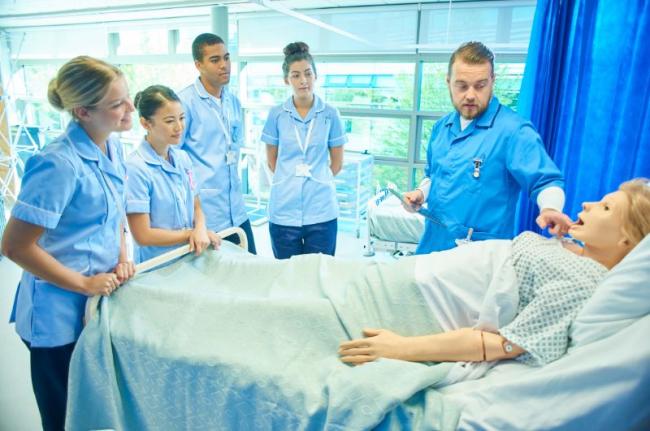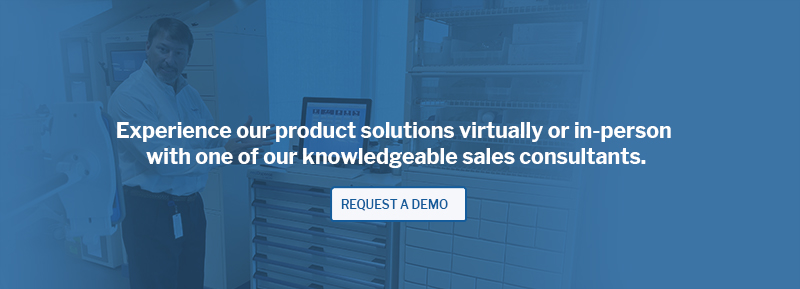Top 4 Ways to Make Simulation Labs Impactful
Healthcare simulation labs give providers-in-training exceptional opportunities to perfect their knowledge and skills in safe environments that simulate real-world medical scenarios. Labs range from simple task trainers to complex, fully functioning hospital rooms. High-fidelity mannequins, virtual reality, audio-visual technology, and computer-based simulators create realistic and immersive learning experiences that prepare healthcare professionals to enter the field ready to deliver better patient care, make fewer errors, and increase positive outcomes.
Scenario-based learning within the lab presents students with simulated emergencies and complex cases, challenging them to think on their feet. Scenario-based learning is an active learning approach that encourages learners to engage with the material actively. Instead of passively receiving information, learners are challenged to solve problems, make decisions, and apply their knowledge in different contexts. This engagement helps to deepen their understanding and retention of the material. A focus on practical application helps our future healthcare professionals transfer their learning to their work once they are out in the real-world. Perhaps most importantly, scenario-based learning provides immediate feedback to students. They can see the impact of their decisions and actions in real-time, which helps them adjust their approach and learn from their mistakes. This feedback loop is critical in helping learners improve their skills and knowledge. At the end of the day, controlled exposure through simulation helps trainees develop the advanced critical thinking and problem-solving skills essential for effective performance in critical situations.
Healthcare information technology plays a large role in rounding out the most robust simulation labs. Whether it is mobile point of care systems or mounted solutions, it’s important that our future clinicians learn how to put the patient at the center of their focus and not the technology. World-class care is more easily delivered when the medical staff knows how to effectively incorporate these technologies into their daily routine.
In addition to point of care technologies, it’s equally if not more important to train students in a simulation lab on how to be comfortable with all aspects related to medication dispensing. With today’s latest automated dispensing cabinets (ADCs) and accompanying software, nurses and pharmacists gain hands-on experience with drug administration, dosage calculation, and drug interactions before caring for actual patients. These low-risk, high-tech experiences build confidence and competence in managing medications effectively and enhancing students’ ability to identify potential errors and prevent them from happening. Students who complete this type of training are also better equipped to educate patients on potential side effects and the importance of adherence, empowering them to take active roles in creating positive care outcomes.
Experienced professionals already working in the field also benefit from continued education in medication management through simulated learning. As new medications and protocols are introduced, simulation labs make it easy for nurses and pharmacists to stay current on the latest developments and best practices in medication management. Ongoing training aided by advanced technology leads to improved patient safety and reduced medication errors in real-world settings.
For ADCs, high-fidelity mannequins, virtual reality, audio-visual technology, and computer-based simulators to function as close to actual hospital settings while recording and providing valuable feedback to both students and instructors, they must be properly linked through specialized management software.
Adaptive technology designed to power healthcare training simulation is a type of specialized management software. It merges essential information across multiple environments to help organizations align performance and capabilities between education, training, and active provider care. When designed to eliminate separate data silos, these adaptive technologies allow administrators and educators to connect and analyze performance data from curriculum, devices, environments, and training instruments, making it an invaluable source for the evaluation and feedback students need to grow.
Simulation labs provide future nurses and pharmacists with hands-on opportunities in collaborative environments that closely mimic actual healthcare settings. Hardware, software, and specialized equipment are key to connecting all the elements needed to create a highly interactive and effective lab. Medical errors are far too common. If students can learn proper use of technology and especially proper dispensing procedures, they can reduce medication errors, ensure patient safety, and meet regulatory requirements.
Medication dispensing is an especially essential technology to use in a simulation lab. Dispensing medications is a major part of nurses and pharmacists daily routine. The cost of errors is very high. By educating them on medication delivery practices and technology, nursing and pharmacy programs can help ensure that their graduates are prepared for their profession, prepared to meet regulatory requirements and provide safe and effective medication administration.
But not all technology is equal. TouchPoint Medical offers ADCs with software that is intuitive, reliable and affordable. Students have enough stress during school. Training them on technology that is easy to learn will lead to greater understanding, compliance and overall improved outcomes.



